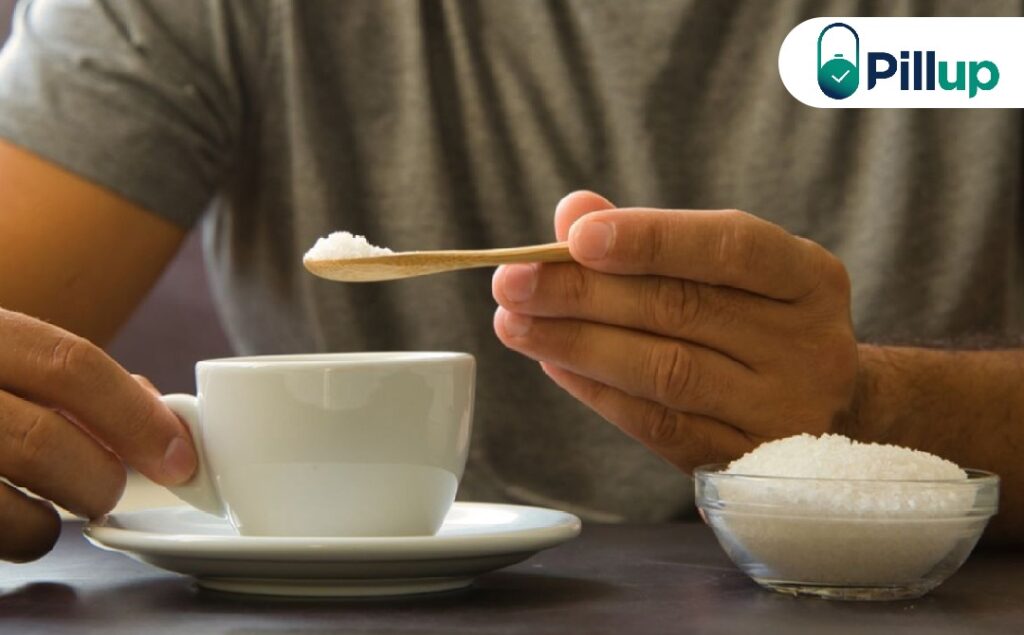Who does not loves sweet? Ice cream, cakes, and chocolates are just a few of the yummy desserts that we crave for. However, have you ever thought that consuming too much sugar can lead to something dangerous? Yes, one of the consequences of eating too much sugar is diabetes. Sugar can be found in almost everything we eat and drink such as soda, energy drinks, table sugar, honey, and fruit juices.
In short, sugar can be classified as a simple carbohydrate that is composed of two monosaccharides- glucose and fructose. Once we consume foods or beverages that contain sugar, they will be broken down into individual molecules of glucose and fructose in our digestive system.
These molecules will then be absorbed into our bloodstream and will be used by our cells for energy. When there is an excess of sugar in our blood, it will cause damage to our blood vessels and nerves.
Over time, this can lead to serious complications such as heart disease, stroke, kidney failure, and blindness. In addition, consuming too much sugar can also lead to weight gain. But in this article, we are going to focus on whether sugar can cause diabetes or not, and if it can, how?
Before we move on, it is important to first understand what diabetes is and its types.
What is diabetes?
In simple terms, diabetes is a condition where there is an excessive amount of sugar in our blood. Our pancreas produces a hormone called insulin which helps to regulate the level of sugar in our blood by moving it into our cells to be used for energy.
However, in people with diabetes, either their pancreas does not produce enough insulin or their cells are resistant to insulin. As a result, the sugar in their blood cannot be moved into their cells and it builds up in their bloodstream instead.
Types of diabetes.
Type 1 diabetes
Also known as juvenile diabetes or insulin-dependent diabetes, type 1 diabetes usually develops in children or young adults. In this type of diabetes, the body does not produce insulin at all.
As a result, people with type 1 diabetes have to take insulin injections daily in order to stay alive. Type 1 diabetes is not caused by lifestyle factors and it cannot be prevented.
Type 2 diabetes
Type 2 diabetes is the most common type of diabetes. It usually develops in adults but it is now also developing in children and adolescents due to the rise in obesity rates.
In type 2 diabetes, either the pancreas does not produce enough insulin or the cells are resistant to insulin. Unlike type 1 diabetes, type 2 diabetes can be prevented by making lifestyle changes such as eating a healthy diet and exercising regularly.
Read More- Understanding Diabetes – Everything You Need To Know
How is sugar metabolized?
Before we move on to whether sugar can cause diabetes, it is important to understand how our body metabolizes sugar.
As mentioned earlier, when we consume foods or drinks that contain sugar, they will be broken down into individual molecules of glucose and fructose in our digestive system. These molecules will then be absorbed into our bloodstream and will be used by our cells for energy.
In a healthy individual, the level of sugar in the blood will be regulated by insulin. Insulin is a hormone produced by the pancreas that helps to move the sugar in our blood into our cells to be used for energy.
Once the sugar has been moved into our cells, it will be broken down further to produce energy. Any excess sugar will be stored in our liver in the form of glycogen.
Our liver can store up to about 100g of glycogen. Once this storage is full, any excess sugar will be converted into fat and stored in other tissues in our body such as our adipose tissue. Now that we have an understanding of how our body metabolizes sugar, let’s move on to whether sugar can cause diabetes.
Does sugar cause diabetes or not?
The short answer is yes, sugar can cause diabetes. Studies have shown that there is a strong link between sugar consumption and type 2 diabetes. In fact, the overconsumption of sugar is one of the main dietary causes of type 2 diabetes.
When we consume too much sugar, our pancreas has to produce more insulin to regulate the level of sugar in our blood. Over time, this can lead to the pancreas becoming fatigued and not being able to produce enough insulin.
As a result, the sugar in our blood will build up and this can lead to type 2 diabetes. In addition, the overconsumption of sugar can also lead to weight gain.
As we mentioned earlier, obesity is one of the main risk factors for type 2 diabetes. This is because obese individuals are more likely to have insulin resistance, where their cells do not respond properly to insulin.
Therefore, when they consume sugar, their pancreas has to produce more insulin in order to regulate their blood sugar levels. Over time, this can lead to the development of type 2 diabetes.
So, if you are looking to prevent or manage diabetes, it is important to cut down on your sugar intake.
Are natural sugars or sweeteners bad?
You might be thinking, if sugar can cause diabetes, then are natural sugars or sweeteners bad as well?
The short answer is no, they are not bad. In fact, they can actually be helpful in preventing or managing diabetes. This is because natural sugars and sweeteners contain other nutrients that can help to regulate blood sugar levels.
For example, honey contains antioxidants and minerals that can help to slow down the absorption of sugar in the bloodstream.
In addition, natural sugars and sweeteners also tend to be lower on the glycemic index than regular sugar. The glycemic index is a measure of how quickly a food will raise your blood sugar levels.
A food that has a high glycemic index will raise your blood sugar levels more quickly than a food with a lower glycemic index. This is because foods with a high glycemic index are usually ones that are high in simple sugars, which are absorbed very quickly by the body.
On the other hand, foods with a lower glycemic index are usually ones that are high in complex carbohydrates, which take longer for the body to break down and absorb.
Therefore, if you are looking to prevent or manage diabetes, it is best to choose natural sugars and sweeteners that are lower on the glycemic index.
Some examples of natural sugars and sweeteners that are lower on the glycemic index include honey, agave syrup, and molasses.
Do Artificial sweeteners Cause Diabetes?
You might have also heard that artificial sweeteners can cause diabetes. However, there is no evidence to support this claim. In fact, artificial sweeteners have actually been shown to be helpful in managing diabetes.
Artificial sweeteners are sweeter than regular sugar but contain very few calories. In addition, they do not raise blood sugar levels like regular sugar does. This is because artificial sweeteners are not broken down into glucose in the body.
Instead, they are excreted in the urine. Therefore, artificial sweeteners can be a good option for people with diabetes.
Some examples of artificial sweeteners include stevia, aspartame, and sucralose.
Other factors which can cause diabetes.
In addition to the overconsumption of sugar, there are other factors that can cause diabetes.
These include:
Physical inactivity:
Physical inactivity is a major risk factor for type 2 diabetes. This is because when we are physically active, our cells become more sensitive to insulin.
This means that they are better able to take up glucose from the bloodstream and use it for energy. In addition, physical activity also helps to reduce body fat, which can also help to prevent type 2 diabetes.
Unhealthy diet:
An unhealthy diet is another major risk factor for type 2 diabetes. This is because a diet that is high in unhealthy foods can lead to weight gain, which can increase the likelihood of developing insulin resistance. Unhealthy foods include processed foods, refined carbohydrates, and saturated fats.
Age:
Age is also a risk factor for type 2 diabetes. This is because as we get older, our cells become less sensitive to insulin. In addition, the pancreas also becomes less efficient at producing insulin as we age.
Conclusion
We hope we were able to answer your question and that now you understand the risks associated with consuming too much sugar. If you are concerned about your risk of developing diabetes, we recommend speaking with a healthcare professional. They can help to assess your risk and provide guidance on how to prevent or manage the condition.
Also, remember that consuming a little bit of sugar is important for a balanced diet. When you have diabetes, it is important to maintain a healthy diet and lifestyle. This means choosing foods that are lower in sugar, fat, and calories and being physically active every day. Thank you for your time!



